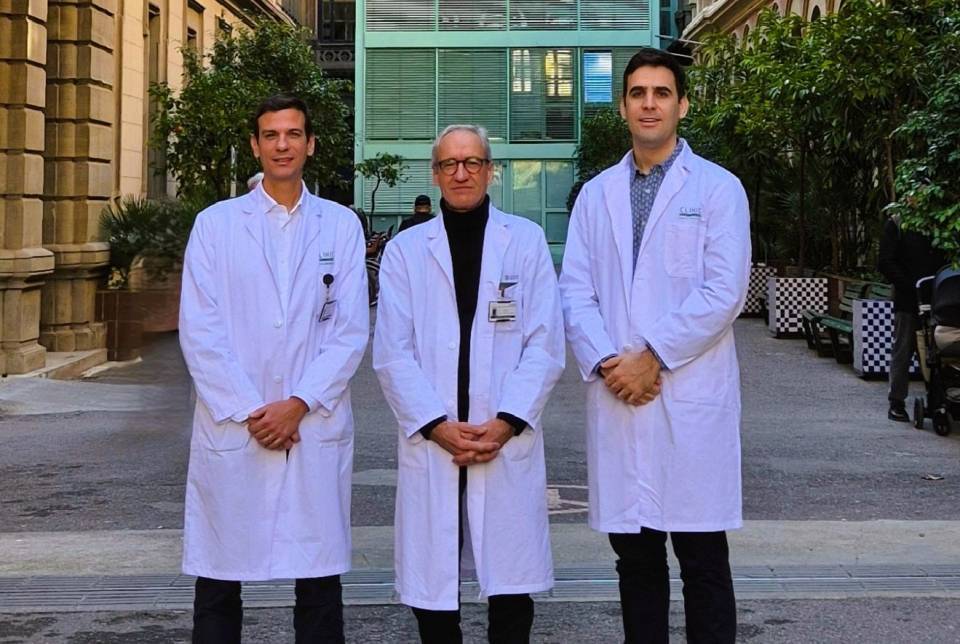Researchers from Hospital Clínic-IDIBAPS took part in a large European multicenter study proving that, for low-risk myocardial infarction patients who undergo angioplasty, aspirin treatment can be safely shortened to just one month. After that period, only a second antiplatelet agent is maintained, with equal efficacy in preventing new cardiac events and a reduction in hemorrhagic episodes.
This finding could change standard practice after a heart attack, where the norm so far has been to take aspirin together with another antiplatelet drug for 12 months—a strategy that has led to more bleeding complications for many patients.
Dr. Salvatore Brugaletta, cardiologist at Hospital Clínic and researcher in the Atherosclerosis, coronary disease and heart failure group at IDIBAPS, has participated in this study, published in The New England Journal of Medicine
What is a heart attack and why are antiplatelet medications used afterwards?
A myocardial infarction occurs when a coronary artery becomes blocked, cutting off blood supply to the heart and damaging heart muscle. The main immediate treatment is angioplasty, a procedure to reopen and restore blood flow in the blocked artery, often with a stent (a small metal mesh tube that keeps the artery open).
After angioplasty, patients must take antithrombotic medications called antiplatelets, to prevent further clots forming inside the stent or in other arteries. The usual combination is aspirin plus a second agent, typically for 12 months.
However, prolonged double antiplatelet therapy increases bleeding risk, which can be serious. “That’s why it’s essential to balance preventing clots that could cause recurrent heart attacks with minimizing the risk of bleeding,” explains Salvatore Brugaletta.
Multicenter European study with more than 1,900 patients
The study included 1,942 low-risk heart attack patients treated at 40 hospitals across Europe, all of whom received complete angioplasty with state-of-the-art stents. After completing one month of aspirin plus second antiplatelet, participants split into two groups: one continued dual therapy for 12 months, and the other stopped aspirin and maintained only the second agent for the following 11 months.
The aim was to compare whether omitting aspirin after the first month was equally safe for prevention of cardiovascular events and whether it could reduce bleeding complications.
Shorter aspirin therapy after heart attack: safer and effective
Results showed that stopping aspirin after one month did not increase the risk of death, reinfarction, stent thrombosis or stroke. Both groups had very low and similar rates of these events.
In contrast, the group that stopped aspirin early experienced 54% fewer clinically relevant bleeding events—a significant difference that improves quality of life and reduces medical complications.
“This study provides robust evidence that, for low-risk heart attack patients treated successfully with complete revascularization and modern technology, the duration of aspirin therapy can be reduced—minimizing bleeding risk without compromising protection against new cardiac events,” notes Dr. Brugaletta.
This strategy for individualizing therapy is key to offering safer and more personalized care.
“The next step is to keep moving forward with personalized therapy duration, tailored to each patient's clinical and risk factors, to optimize benefit and minimize risks,” concludes Salvatore Brugaletta.
Study reference:
Tarantini, G., Honton, B., Paradies, V., Lemesle, G., Range, G., Godin, M., Mangin, L., Cuisset, T., Ruiz-Nodar, J. M., Brugaletta, S., Lhermusier, T., Piot, C., De Poli, F., Macia, J. C., Motreff, P., Madera-Cambero, M., Beygui, F., Riccini, P., Ranc, S., Oreglia, J. A., … TARGET-FIRST Investigators (2025). Early Discontinuation of Aspirin after PCI in Low-Risk Acute Myocardial Infarction. The New England journal of medicine, 10.1056/NEJMoa2508808.




